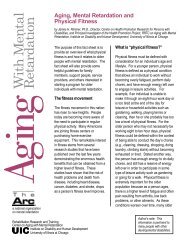Bridging the Aging and Developmental Disabilities Service ... - rrtcadd
Bridging the Aging and Developmental Disabilities Service ... - rrtcadd
Bridging the Aging and Developmental Disabilities Service ... - rrtcadd
Create successful ePaper yourself
Turn your PDF publications into a flip-book with our unique Google optimized e-Paper software.
<strong>the</strong> State Demonstrations to Integrate Care for Dual Eligible Individuals CMS awarded contracts<br />
to fifteen states to design service delivery models that integrate health care <strong>and</strong> long term<br />
services <strong>and</strong> supports <strong>and</strong> to improve <strong>the</strong> coordination of Medicare <strong>and</strong> Medicaid benefits to<br />
cover <strong>the</strong>ir costs. Thirteen states specified <strong>the</strong>y will include dual eligible individuals with<br />
developmental disabilities in <strong>the</strong>ir demonstrations. These fifteen states plus 22 o<strong>the</strong>r states <strong>and</strong><br />
<strong>the</strong> District of Columbia have submitted letters of intent to test two financial alignment models<br />
CMS proposed to determine <strong>the</strong>ir impact on improving beneficiary experiences <strong>and</strong> quality<br />
outcomes while reducing health <strong>and</strong> long-term care costs. Both models will include all primary,<br />
acute, behavioral health, <strong>and</strong> long-term services <strong>and</strong> supports covered by Medicare <strong>and</strong><br />
Medicaid.<br />
1. The Capitated Model provides <strong>the</strong> managed care organization with a blended rate in<br />
which CMS covers <strong>the</strong> Medicare portion of <strong>the</strong> payment <strong>and</strong> states fund <strong>the</strong> Medicaid<br />
share. CMS <strong>and</strong> <strong>the</strong> state will share any savings resulting from <strong>the</strong> capitated rate<br />
compared to fee for service costs.<br />
2. The Managed Fee-for-<strong>Service</strong> Model makes <strong>the</strong> state responsible for coordinating <strong>the</strong><br />
care of dual beneficiaries <strong>and</strong> delivering fully integrated Medicare <strong>and</strong> Medicaid benefits.<br />
Under <strong>the</strong> current system, CMS administers Medicare benefits. Both managed care<br />
options permit states to incorporate coordinated service delivery modes included in <strong>the</strong><br />
ACA such as Medicaid Health Homes <strong>and</strong> primary care case management. States will be<br />
eligible for a retrospective performance payment if <strong>the</strong> targeted level of Medicare savings<br />
exceeds any Medicaid cost increases <strong>and</strong> specific quality levels are met. Medicaid <strong>and</strong><br />
Medicare providers are reimbursed on a fee-for-service basis by <strong>the</strong> state <strong>and</strong> CMS<br />
respectively. 43<br />
Both models must incorporate specific safeguards for consumers including person-centered<br />
assessment <strong>and</strong> service planning, <strong>the</strong> right to choose care providers <strong>and</strong> self-direct services,<br />
voluntary plan enrollment, continuity of care when <strong>the</strong>y transition to <strong>the</strong> integrated model,<br />
accessible services, <strong>and</strong> due process for grievances <strong>and</strong> appeals. Dual eligible beneficiaries will<br />
have meaningful input on implementing <strong>the</strong>se models by serving on advisory boards <strong>and</strong> plan<br />
governing boards. 44<br />
Lifespan Respite Care Act (P.L. 109-442)<br />
The Lifespan Respite Care Act authorizes funding for state grants to develop coordinated<br />
systems of respite care across <strong>the</strong> lifespan for all disability groups. It was enacted in 2006 <strong>and</strong> is<br />
up for reauthorization in 2011. Since 2009, Congress appropriated approximately $2.5 million<br />
annually for <strong>the</strong> Lifespan Respite Care Act <strong>and</strong> designated AoA responsible for its<br />
implementation <strong>and</strong> administration. Over <strong>the</strong> past three years, 30 states have been awarded<br />
grants to implement respite programs, including four states that are serving large numbers of<br />
individuals with developmental disabilities: Arizona, Texas, Massachusetts, <strong>and</strong> Wisconsin.<br />
State grantees must involve <strong>the</strong> ADRCs. The AUCD is on <strong>the</strong> steering committee for <strong>the</strong> respite<br />
technical assistance grant AoA awarded to <strong>the</strong> ARCH National Respite Network. 45<br />
<strong>Bridging</strong> <strong>the</strong> <strong>Aging</strong> <strong>and</strong> <strong>Developmental</strong> <strong>Disabilities</strong> <strong>Service</strong> Networks Page 28



